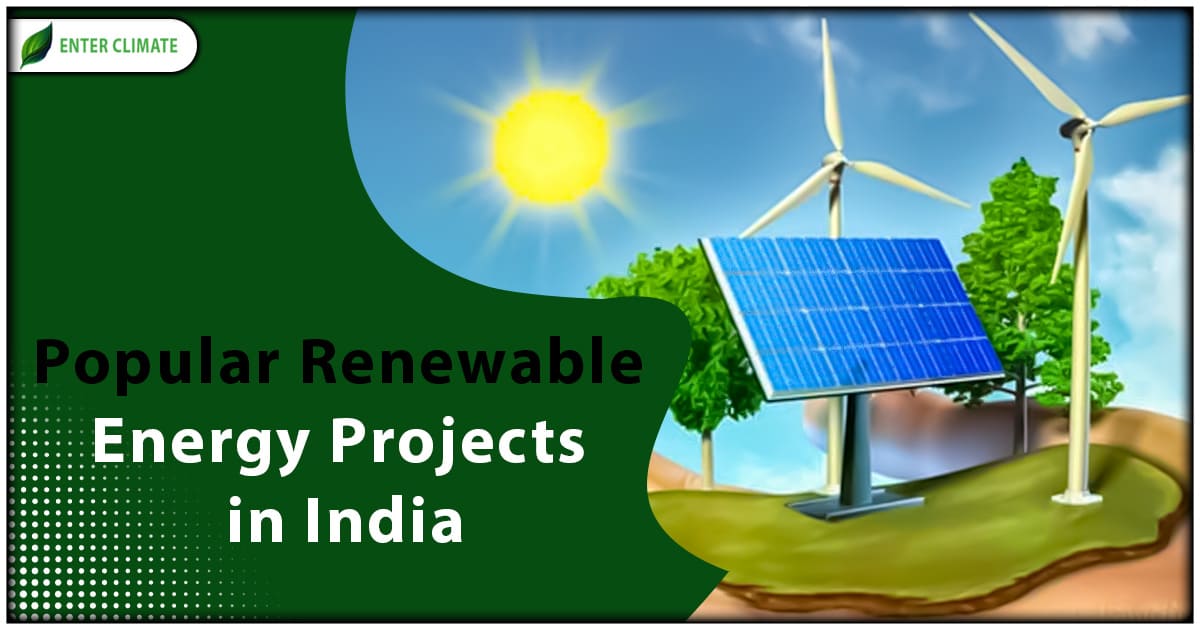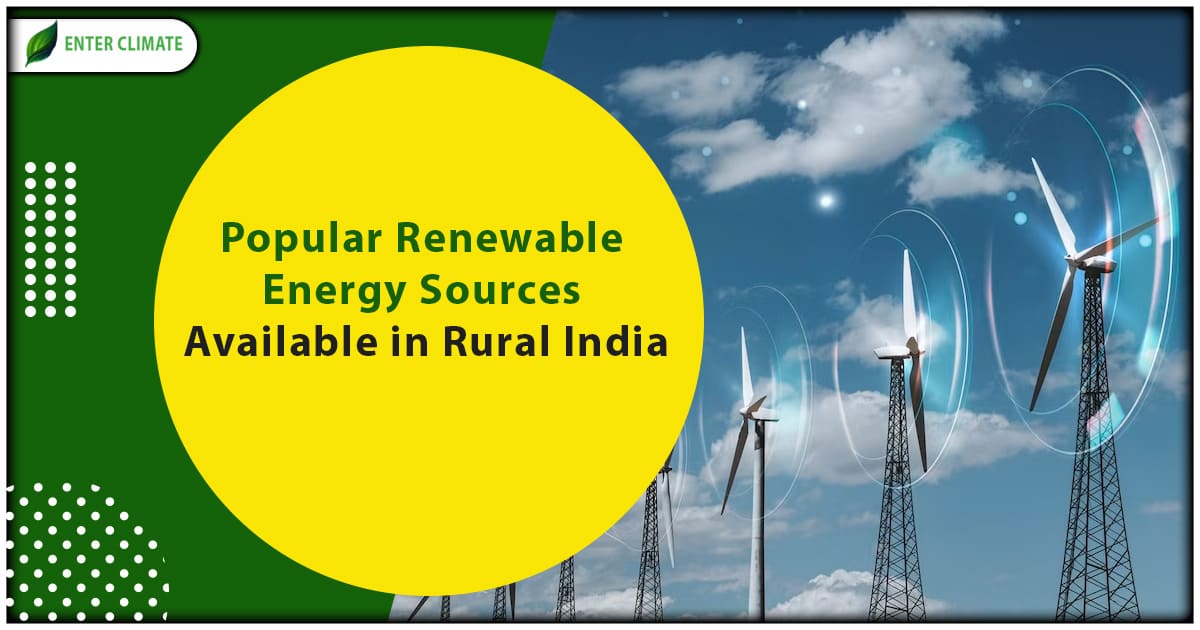Popular Renewable Energy Projects in India
 27 Jul, 2023
27 Jul, 2023 
The renewable energy sector in India is experiencing swift expansion, presenting numerous investment prospects for businesses to engage in renewable energy ventures. India has set an ambitious target of reaching 450 GW of renewable energy capacity by 2030, encompassing solar, wind, hydro, and other renewable sources. The government has introduced several initiatives and policies to foster this growth, such as the National Solar Mission, the Solar Park Scheme, and the Wind Energy Development Program. These measures offer diverse incentives, including tax advantages, subsidies, and preferential tariffs, to support and encourage renewable energy projects.
Renewable energy projects in India
- Puga Geothermal Energy Project, Ladakh
The Puga Geothermal Energy Project in Ladakh uses the region’s geothermal resources, including hot springs and rivers, to establish India’s first geothermal power plant. The project, set to be completed by the end of 2022, will be conducted in three phases, involving well drilling, reservoir exploration, and the development of the geothermal plant, ultimately generating electricity for the area.
- Bhadla Solar Park, Rajasthan
The Bhadla Solar Park, located in Rajasthan’s Jodhpur district, benefits from abundant solar irradiation and vast barren land, making it an ideal site for a solar complex. With construction starting in July 2015 and the first phase commissioned in October 2018, this 2.25 GW solar park is a joint initiative by various organizations. It will contribute significantly to India’s solar energy endeavours.
- Jaisalmer Wind Park, Jaisalmer
As India’s second-largest onshore wind project, the Jaisalmer Wind Park in Rajasthan features wind farm sites aimed at harnessing wind power. Developed by Suzlon Energy, the project has separate budgets for engineering, procurement, construction (EPC), and operation and maintenance (O&M) contracts.
- Rewa Solar Project, Madhya Pradesh
Developed by Rewa Ultra Mega Solar Limited (RUMSL) in Madhya Pradesh‘s Gurh Tehsil, the Rewa Solar Project, commissioned in July 2018, boasts a capacity of 750 MW and uses a vast revenue land for solar energy production. The electricity generated by this project and others by RUMSL will be supplied to Indian Railways in multiple states.
- Brahmanvel Wind Farm, Maharashtra
Situated in Dhule, Maharashtra, the Brahmanvel Wind Farm has a total capacity of 528 MW and was developed by Parakh Agro Industries. Maharashtra ranks third among states with the highest installed wind power in India, with this wind farm contributing to the overall capacity.
- Gobar‐Dhan Bio‐CNG Plant, Indore
The Gobar‐Dhan Bio‐CNG Plant in Indore represents India’s focus on converting organic waste into green fuel. Inaugurated in February 2022, it is Asia’s largest facility of its kind and converts a substantial amount of organic waste into CNG and organic compost daily, providing clean energy and benefiting farmers.
- Vankusawade Wind Park, Maharashtra
Maharashtra, contributing 13% of India’s total wind power capacity, houses the Vankusawade Wind Park, one of three major wind parks in the state. Developed by Suzlon Energy and located 40 km from Satara, this wind farm had an installed capacity of 570.15 MW in March 2015.
- Ramky Enviro Landfill, Gas to Bio‐CNG Plant, Hyderabad
The Ramky Enviro Landfill, Gas to Bio‐CNG Plant, inaugurated in 2021, is the world’s first and India’s largest landfill gas-to-compressed biogas plant. With a capacity of 755 Nm3/hr, this facility produces eco-friendly fuel, promoting the concept of a circular economy.
- Shakti Sthala Solar Project, Karnataka
Regarded as the world’s largest solar park, the Shakti Sthala Solar Project in Karnataka’s Pavagada region involved an investment of Rs 16,500 crore. As part of the Karnataka Solar Policy 2014-2021, the project is being constructed in two phases, covering a vast area and boasting a capacity of 2,000 MW.
- Simhadri Floating Solar PV Plant, Andhra Pradesh
Commissioned in 2021 and spearheaded by the National Thermal Power Cooperation (NTPC) Limited, the Simhadri Floating Solar PV Plant has a capacity of 25 MW. This project contributes to India’s efforts to harness solar power, as the country ranks fifth globally in terms of solar installed capacity.
- Kurnool Ultra Mega Solar Park, Andhra Pradesh
Termed the world’s largest single-location operational solar park, the Kurnool Ultra Mega Solar Park, with a capacity of 1,000 MW, is a significant endeavour by Andhra Pradesh Solar Power Corporation Pvt Ltd.
- Pavagada Solar Park, Karnataka
Commissioned in 2018, the Pavagada Solar Park in Karnataka features a multi-phase plan, aiming for 600 MW in the first phase and 1,400 MW in the subsequent phases. With an estimated budget of Rs 14,800 crore, this solar park covers an extensive area and provides an alternative energy source for the locals.
- Muppandal Wind Farm, Tamil Nadu
Situated in Tamil Nadu, the Muppandal Wind Farm is India’s largest wind farm, boasting a capacity of 25.5 MW. Developed by the Tamil Nadu Energy Development Agency (TEDA) in 2007, this project reflects India’s remarkable progress in transitioning from conventional to renewable energy sources.
Opportunities for Green Entrepreneurs in the Renewable Energy Sector
The opportunities for entrepreneurs in the Renewable energy sector are as follows:
- Solar Panel Installation and Maintenance: Start a business offering solar panel[1] installation services for residential, commercial, and industrial properties, along with maintenance and repair services to ensure optimal performance.
- Wind Turbine Farm Development: Establish and operate wind turbine farms to generate wind energy by leasing land or selling electricity to the grid.
- Biomass Energy Production: Create a business utilizing agricultural waste, organic materials, or wood to produce bioenergy like biogas, biofuel, or biomass pellets.
- Solar-Powered Product Retail: Set up a retail venture selling solar-powered products, including lights, chargers, and gadgets for residential and outdoor use.
- Renewable Energy Consulting: Provide consultancy services to individuals, businesses, and governments on transitioning to renewable energy solutions.
- Energy Efficiency Auditing: Initiate an energy efficiency auditing firm assessing buildings and facilities to identify energy-saving opportunities and recommend renewable energy integration.
- Solar Water Heater Manufacturing: Manufacture and sell solar water heaters for energy-efficient water heating solutions.
- Renewable Energy Education and Training: Offer workshops, courses, and training programs on renewable energy technologies, installation, and maintenance.
- Smart Grid and Energy Storage Solutions: Develop and deploy smart grid technologies or energy storage solutions to better integrate renewable energy into the power grid.
- Community-Based Renewable energy projects: Initiate community-driven renewable energy projects where residents collectively invest in and benefit from clean energy generation.
- Renewable Energy Microgrid Systems: Design and implement microgrid systems using renewable energy sources to provide electricity to remote or off-grid areas.
- Solar Panel Recycling and Repurposing: Establish a business that recycles end-of-life solar panels and repurposes materials for other sustainable products.
Licenses and permits required for Entrepreneurs in Renewable energy projects
The licenses and permits needed for Renewable energy projectsto be eligible for the government’s subsidies and benefits provided through India’s solar park scheme are as follows:
- Business Entity Registration – The initial step involves registering the solar business as a legal entity, which can take the form of a proprietorship under the Shop and Establishment Act, a limited liability partnership under the Limited Liability Partnership Act, 2008, or a company under the Companies Act, 2013.
- GST Registration – All businesses engaged in taxable supplies of goods or services must obtain GST registration. Businesses that exceed the turnover threshold of 20 Lakhs (for Services) are required to register and obtain a GST number.
- ISO Certification – Acquiring ISO Certification is essential to ensure service quality and establish customer trust.
- Trademark Registration – To enhance the business’s reputation and recognition, it is advisable to pursue trademark registration for its services, thereby protecting the distinctiveness of its offerings.
Documents required for starting Renewable energy projects
Each of the documents that are required for starting Renewable energy projects plays a crucial role in the legal and operational aspects of renewable energy businesses. Various renewable energy businesses may necessitate specific documents, but there are several standard documents required as follows:
• Company Incorporation
• Articles of Association
• Memorandum of Association
• GST Registration
• Trademark Registration
• MSME Registration
• Shop and Establishment license
•Pollution NOC (No Objection Certificate)
• Permanent Account Number (PAN)
• Tax Deduction and Collection Account Number (TAN)
• Bank Account details
• Loan Documents
• CEIG (Chief Electrical Inspectorate) Approval
Conclusion
Renewable energy projects play a crucial role in addressing the global challenges of climate change, energy security, and environmental sustainability. They offer significant benefits, including reduced greenhouse gas emissions, decreased reliance on fossil fuels, and enhanced energy diversification. As technology advances and economies of scale improve, renewable energy sources such as solar, wind, hydro, geothermal, and biomass are becoming increasingly competitive and cost-effective. These projects contribute to mitigating the impacts of climate change and stimulate economic growth, create job opportunities, and promote sustainable development. Continued investment and support for renewable energy projects are essential to achieve a cleaner and greener future. It is highly recommended to take expert consultation to ensure the proper documents and licenses are arranged for the specific project.
FAQs
The Bhadla Solar Park stands as the largest solar power plant globally it is located in the village of Bhadla, situated in Rajasthan’s Jodhpur district, renowned for its solar-friendly high temperatures.
Solar Power: 66.7 gigawatts (GW). Biomass/Co-generation: 10.2 GW. Small Hydro Power: 4.94 GW. Waste To Energy: 0.55 GW.
According to the most recent data compiled by the International Energy Agency and CEEW, Acme Solar, Adani, and Greenko are the leading solar power producers in India in terms of capacity. In the wind energy sector, Renew Power, Greenko, and Sembcorp occupy the top positions.
The Kutch desert, covering approximately 72,600 hectares or 726 square kilometres, is acclaimed as the largest hybrid solar-wind power park in the world.
India has approved 59 solar parks with a combined capacity of 40 GW. Among these, the top 5 operational solar parks with a total capacity of 7 GW include Pavagada (2 GW), Kurnool (1 GW), and Bhadla-II (648 MW).
Renewable energy projects refer to initiatives and undertakings that harness and utilize naturally replenished energy sources to produce clean and sustainable electricity or heat.
In India, renewable energy resources consist of Hydroelectric power, Solar power, nuclear power, Bioenergy, Biomass, Biogas, Biofuel, Bio Ethanol, Biodiesel, and Wind power.
Rajasthan leads India’s transition to renewable energy with an impressive installed capacity of over 24.4 GW in renewable energy projects.
Solar, wind, and run-of-the-river hydroelectricity are cost-effective and eco-friendly energy sources that are considered essential “must-run” power sources in India.
Solar power refers to the energy harnessed from the sun, which can be converted into either thermal or electrical energy. Among renewable energy sources, solar energy stands out as the cleanest and most abundant option.
Read our Article: Renewable Energy Sources And Their Potential In India
Categories
Latest Post
Air pollution Dispersion Modeling
Natural Disaster Risk Assessment
Endangered Species Protection
Aquifer Recharge Project
Sustainable Sanitation Solutions














